|
|
|
Sort Order |
|
|
|
Items / Page
|
|
|
|
|
|
|
| Srl | Item |
| 1 |
ID:
111000
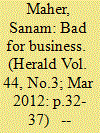

|
|
|
| 2 |
ID:
158942
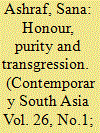

|
|
|
|
|
| Summary/Abstract |
Since the incorporation of anti-blasphemy laws protecting the religious sentiments of the Muslim majority in the Pakistan Penal Code in the 1980s, Pakistan has seen several cases of extra-judicial killings, mob violence and vigilante action against the accused. Based on my fieldwork in Punjab, Pakistan, this paper deals with the meanings associated with blasphemy, and violent action that follows the accusations. Focusing on everyday interactions at a local level, I argue that certain understandings of the notions of honour, shame, purity, and transgression provide meaning as to what constitutes blasphemy and what are desirable courses of action to be taken in response to perceived blasphemy. I further demonstrate how public religious discourse is utilized to mobilize people, by actively legitimizing violence in the name of love, and framing as the hero – a true Muslim – one who can kill for the sake of love and hence is capable of preventing shame by defending the Prophet’s honour.
|
|
|
|
|
|
|
|
|
|
|
|
|
|
|
|
| 3 |
ID:
122873
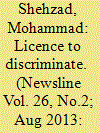

|
|
|
| 4 |
ID:
170472
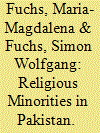

|
|
|
|
|
| Summary/Abstract |
This introduction to the special section of South Asia: Journal of South Asian Studies, titled ‘Religious Minorities in Pakistan’, reviews the existing scholarship on this topic, points out gaps in the research, and discusses problematic notions and assumptions in both popular and academic discourses on minorities. Furthermore, it attempts a definition of the term ‘religious minority’, demonstrates its extensive entanglement with the question of caste—a characteristic specific to the South Asian case—and situates this discourse within broader debates about post-colonial state-building, the history of sectarianism in the region, contestations over religious authority, and the striving for a coherent political and cultural identity in Pakistan, the second-largest Muslim nation in the world.
|
|
|
|
|
|
|
|
|
|
|
|
|
|
|
|
| 5 |
ID:
118139
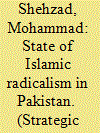

|
|
|
|
|
| Publication |
2013.
|
| Summary/Abstract |
The soil of Pakistan, because of its culture, customs, traditions, values, the temperament of the people and even state policies, provides the ideal ground for Islamic radicalism, extremism, sectarianism and terrorism. The foundation of religious bigotry and Islamic fundamentalism had been laid down in Pakistan-perhaps inadvertently-when poets like Allama Iqbal dreamt of Pakistan and the All-India Muslim League coined the term 'Two-Nation Theory' (TNT, to be read apart from an explosive that goes by the same acronym) under the leadership of Mohammad Ali Jinnah, raising the demand for a separate homeland for the Muslims of the subcontinent. At that time, the ultimate objective was to safeguard and secure the interests of the Muslim feudal lords (especially in the Muslim minority provinces of British India) and get rid of the perceived supremacy of the Hindus in a representative and democratic setup. The basic assumption that drove the demand for separation at that time was that the Muslims-namely the Shias, the Ahmadis, the Barelvis, the Ahle Hadith and the Deobandis-constituted one nation and they could not co-exist with the Hindus, the other nation.
|
|
|
|
|
|
|
|
|
|
|
|
|
|
|
|
|
|
|
|
|